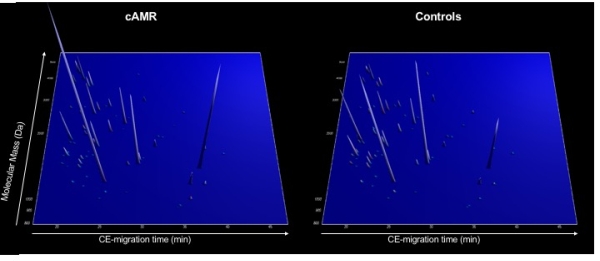Urinary Proteomics as a Dignostic Mean for Chronic Humoral Rejection after Pediatric Kidney Transplantation
Pediatric Nephrology, Hannover Medical School, Hannover, Germany
Mosaqiues Diagnostics, Hanonver, Germany.
Meeting: 2018 American Transplant Congress
Abstract number: B207
Keywords: Rejection
Session Information
Session Name: Poster Session B: Kidney: Pediatrics
Session Type: Poster Session
Date: Sunday, June 3, 2018
Session Time: 6:00pm-7:00pm
 Presentation Time: 6:00pm-7:00pm
Presentation Time: 6:00pm-7:00pm
Location: Hall 4EF
Chronic antibody-mediated rejection (cAMR) is the main cause of long-term graft loss and presents a diagnostic challenge in renal transplantation medicine. Late-stage diagnosis is made by detecting donor-specific antibodies (DSA) in the blood in combination with typical histomorphological observations on graft biopsy. Leak of non-invasive biomarkers for detection of cAMR permits screening and earlier diagnosis.
In a case-control study, urine samples from 16 pediatric patients (mean age 13.3yrs, range 3–18yrs) were analyzed using capillary electrophoresis together with mass spectrometry. At time of cAMR diagnosis, mean time of posttransplantation was 6yrs (range 1–13yrs). Patients were matched with 24 post-kidney transplant pediatric patients without cAMR (no DSA, normal graft biopsy, mean age 14.7yrs, range 9-23yrs) via the CERTAIN Registry for age, gender, time after transplantation, and living donation.
The non-parametric Wilcoxon test was used for statistical analysis, identifying 79 significant biomarkers (p<0.05) which were then combined in a support vector machine-based classifier.  After validation in an independent cohort of 12 pediatric patients with and 8 without cAMR, the AUC for detection of cAMR was 0.896, with sensitivity 100% and specificity 75%. However, the combination of this classifier for cAMR with a previous developed classifier for kidney diseases (CKD273) improved the detection of patients with cAMR (AUC=0.917) and only 2 of 20 individuals of the cohort were misclassified. Most peptides of the cAMR-classifier were fragments of the collagen I alpha chain.
After validation in an independent cohort of 12 pediatric patients with and 8 without cAMR, the AUC for detection of cAMR was 0.896, with sensitivity 100% and specificity 75%. However, the combination of this classifier for cAMR with a previous developed classifier for kidney diseases (CKD273) improved the detection of patients with cAMR (AUC=0.917) and only 2 of 20 individuals of the cohort were misclassified. Most peptides of the cAMR-classifier were fragments of the collagen I alpha chain.
This non-invasive test for cAMR is currently ready for prospective validation in a larger cohort and for evaluation in longitudinal studies with the aim of identifying those patients who would profit from early graft biopsy and intensification of immunosuppression at an earlier stage after kidney transplantation.
CITATION INFORMATION: Pape L., Melk A., Zürbig P., Kanzelmeyer N. Urinary Proteomics as a Dignostic Mean for Chronic Humoral Rejection after Pediatric Kidney Transplantation Am J Transplant. 2017;17 (suppl 3).
To cite this abstract in AMA style:
Pape L, Melk A, Zürbig P, Kanzelmeyer N. Urinary Proteomics as a Dignostic Mean for Chronic Humoral Rejection after Pediatric Kidney Transplantation [abstract]. https://atcmeetingabstracts.com/abstract/urinary-proteomics-as-a-dignostic-mean-for-chronic-humoral-rejection-after-pediatric-kidney-transplantation/. Accessed July 6, 2025.« Back to 2018 American Transplant Congress
